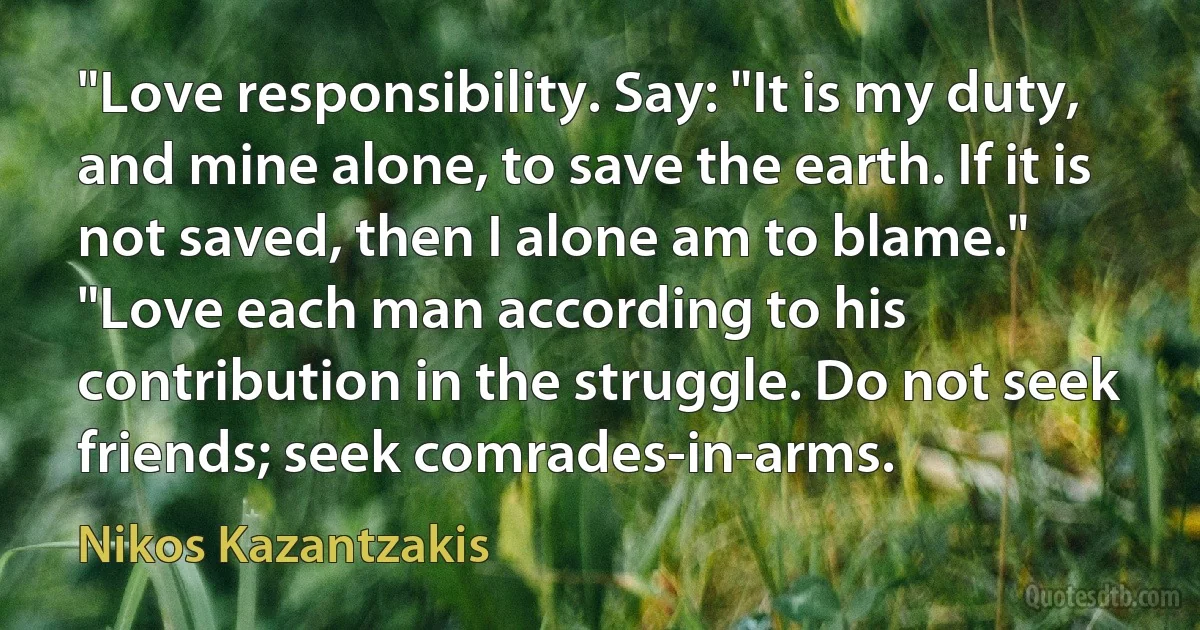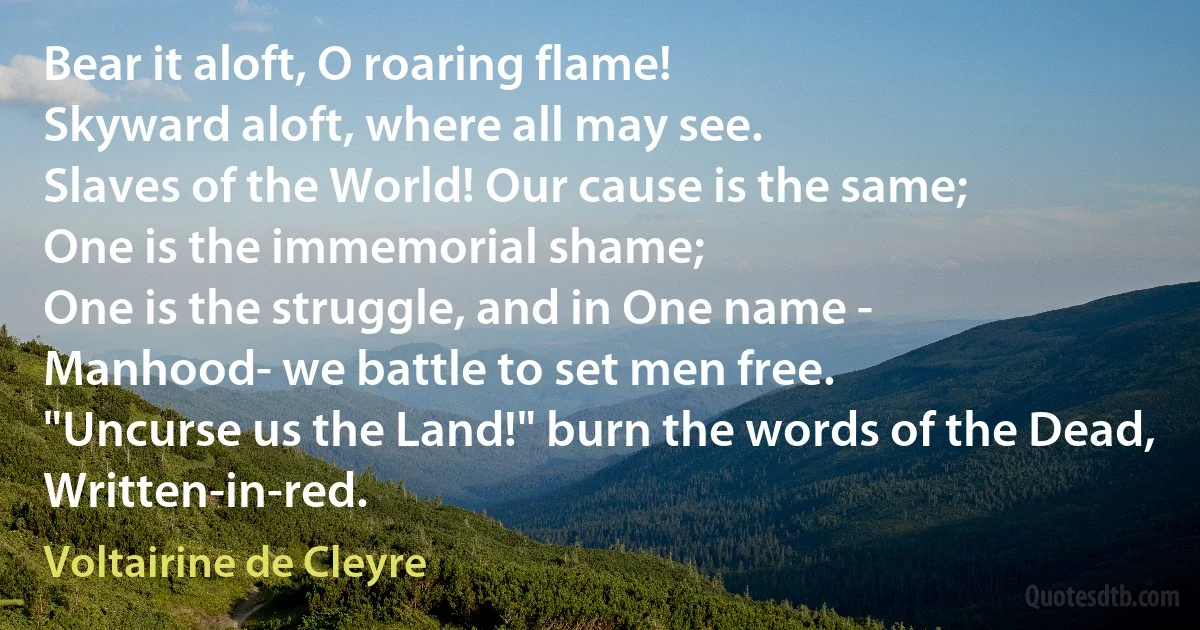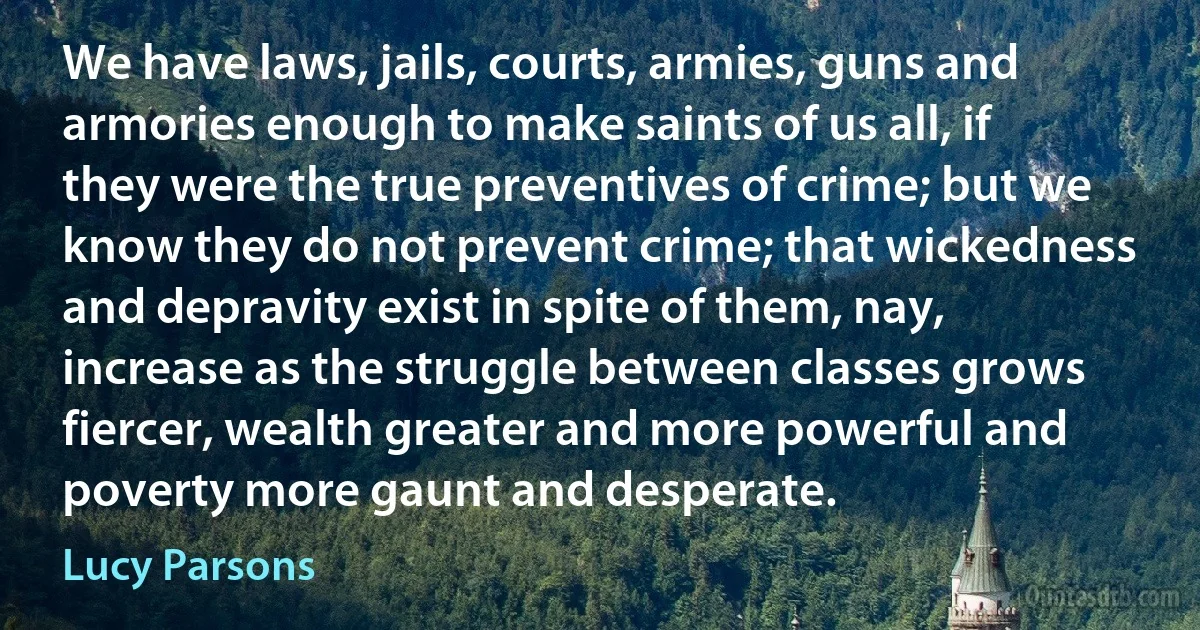Struggle Quotes - page 92
Pain is not the only essence of our God, nor is hope in a future life or a life on this earth, neither joy nor victory. Every religion that holds up to worship one of these primordial aspects of God narrows our hearts and our minds.
The essence of our God is STRUGGLE. Pain, joy, and hope unfold and labor within this struggle, world without end.

Nikos Kazantzakis
We must understand well that we do not proceed from a unity of God to the same unity of God again. We do not proceed from one chaos to another chaos, neither from one light to another light, nor from one darkness to another darkness. What would be the value of our life then? What would be the value of all life?
But we set out from an almighty chaos, from a thick abyss of light and darkness tangled. And we struggle - plants, animals, men, ideas - in this momentary passage of individual life, to put in order the Chaos within us, to cleanse the abyss, to work upon as much darkness as we can within our bodies and to transmute it into light.

Nikos Kazantzakis
Humanity is such a lump of mud, each one of us is such a lump of mud. What is our duty? To struggle so that a small flower may blossom from the dunghill of our flesh and mind.
Out of things and flesh, out of hunger, out of fear, out of virtue and sin, struggle continually to create God.

Nikos Kazantzakis
There are so many amazing young performers now, women are creating so much incredible music that it is simply impossible to ignore it. I was happy to see many more women among the nominees and winners of important music awards than before. Yet there is still too much injustice in the world. Perhaps I feel it so strongly because I grew up in London and lived in such a bubble of illusion. But, having arrived in America and having found the opportunity, in principle, to travel to different parts of the world, I began to understand how strong this problem is still. I'm just shocked, but this is our reality. And I constantly talk about these topics and struggle with this state of affairs.

Dua Lipa
My grandfather saw a lot of violence and a lot of poverty, and really was incredibly, deeply tortured by it. It was always this elephant in the room that we never talked about growing up. He spoke fluent Spanish, but never in front of us. I think he was really afraid that we would be judged and held back by our Mexican heritage, like he was. Part of writing this play was like digging up my own family ghosts and things that I personally had always been afraid to talk about, because my family never talked about them. Also, because I'm Mexican and I'm white, I often struggle with wondering if I'm "allowed” to tell stories through this lens; growing up, the white kids always told me I was Latina or "ethnic,” and the Chicano kids always told me I was a "gringa,” so I never really felt like I fit in anywhere...

Hilary Bettis
There is not one instance, not one single, solitary instance in which Ambedkar participated in any activity connected with the struggle to free the country. Quite the contrary- at every possible turn he opposed the campaigns of the national movement, at every setback to the movement he was among those cheering for failure.

Bhimrao Ramji Ambedkar
While we were allegedly taking part in a golden age of China, the head of the Chinese Communist Party was instructing party officials and government officials to engage in an intense struggle against all the things that we and other liberal democracies stand for: Rule of law, parliamentary democracy, universally valid human rights, historical inquiry, all those sorts of things.

Chris Patten
Remember what it is for which we struggle. In the first place, it is for the maintenance of religion. You know there is an old proverb, "You may know a man by his associates," and you may notice, if you will follow the course of literature, that infidels are always Liberals.

Robert Gascoyne-Cecil, 3rd Marquess of Salisbury
The North is fighting for no sentimental cause-for no victory of a 'higher civilization'. It is fighting for a very ancient and vulgar object of war-for that which Russia has secured in Poland-that which Austria clings to in Venetia-that which Napoleon sought in Spain. It is a struggle for empire, conducted with a recklessness of human life which may have been paralleled in practice, but has never been avowed with equal cynicism. If any shame is left in the Americans, the first revision they will make in their constitution will be to repudiate formally the now exploded doctrine laid down in the Declaration of Independence, that 'Governments derive their just powers from the consent of the governed'.

Robert Gascoyne-Cecil, 3rd Marquess of Salisbury
After the Sixties there was a collapse in almost everything we believed in. It culminated in the biological disaster of AIDS - an answer to every one of us who preached free love. ... AIDS is a price paid for sins committed in the Sixties, and by gay men who took free love to extremes throughout the Seventies and had unrestrained, decadent, pagan sex. I support paganism in all its forms, but a price must be paid. I believed in free love, too, but we were wrong. It wasn't the Pope who was the problem. It wasn't the struggle with old-fashioned moral codes that was the problem. It was nature. Nature said, "Guess what? If you're going to be that promiscuous, I will off you." ... I believe that nature rewards things that are in its best interest and punishes things that are not.

Camille Paglia
I was thinking a lot about something that wasn't being talked about at the time very much. I was thinking about where sexuality belonged in all this. What is the connection between Vietnam and the lovers' bed? If this insane violence is being waged against a very small country by this large and powerful country in which I live, what does that have to do with sexuality and with what's going on between men and women, which I felt also as a struggle even then?

Adrienne Rich
An enormous amount is happening globally-different kinds of struggle in different countries, in different societies. When you look at South Africa, there's enormous leadership by women. Black women in South Africa are maintaining and creating a structure. In that violence-ridden society, in the midst of revolution, they are creating childcare centers, soup kitchens, planting gardens, keeping things going on that human level. Now I don't think that's just women doing the service work of the world; those women are also leaders of their communities. We could talk about feminism in the Philippines, in Latin America, in the Caribbean, not a monolithic global movement but many movements, all over the world, contending within and against many different cultures. The United States movement is only a small part of the picture.

Adrienne Rich
Silence, Set!” cries Anubis. "Don't listen to him, Madrak. He sees your weakness, as he sees the weaknesses of all things he encounters. He seeks to draw you onto a battlefield of another sort, one where you struggle against yourself, to be beaten by the guilt he has contrived for you. Ignore him!

Roger Zelazny
I'm proud to belong to the NAACP, because it is made up of people who are dedicated in a great crusade to make America true to itself. This is what this is about. Make America live up to its highest hopes and aspirations and translate those hopes and aspirations into practical, tangible reality in the lives of all people, whether they are white or black, whether they live in the North or the South. I say that each of us is blessed that we can be engaged in this crusade, in this struggle for justice, for human dignity, in this struggle to wipe out in every phase of our national life every ugly immoral kind of discrimination.

Walter Reuther
Venezuela's illegitimate regime, one of the Western Hemisphere's most oppressive, presented the Trump Administration an opportunity. But it required steady determination on our part and consistent, all-out, unrelenting pressure. We failed to meet that standard. The President vacillated and wobbled, exacerbating internal Administration disagreements rather than resolving them, and repeatedly impeding our efforts to carry out a policy. We were never confident of success regarding the Venezuelan opposition's efforts to replace Nicholas Maduro, Hugo Chavez's heir. It was almost the opposite. Maduro's opponents acted in January 2019 because they felt this could be their last opportunity for freedom, after years of trying and failing. America responded because it was in our national interest to do so. It still is, and the struggle continues.

John R. Bolton
Our third conflict is against covetousness which we can describe as the love of money; a foreign warfare, and one outside of our nature. ... For the rest of the incitements to sin planted in human nature seem to have their commencement as it were congenital with us, and somehow being deeply rooted in our flesh, and almost cœval with our birth, anticipate our powers of discerning good and evil, and although in very early days they attack a man, yet they are overcome with a long struggle.But this disease coming upon us at a later period, and approaching the soul from without, as it can be the more easily guarded against and resisted, so, if it is disregarded and once allowed to gain an entrance into the heart, is the more dangerous to every one, and with the greater difficulty expelled. For it becomes "a root of all evils" [1 Timothy 6:10] and gives rise to a multiplicity of incitements to sin.

John Cassian
In the first place I urge upon you a full recognition of the magnitude of the evils with which we have to deal; in the second place I insist on the right of those who suffer to redress (cheers); and in the third place I assert the duty of society as a whole to secure the comfort and welfare of all its individual members. As a consequence of this, I desire to submit to you that it belongs to the authority and to the duty of the State-that is to say, of the whole population acting through their chosen representatives-to utilise for this purpose all local experience and all local organisation, to protect the weak, to provide for the poor, to redress the inequalities of our social system, to alleviate the harsh conditions of the struggle for existence, and to raise the average enjoyments of the majority of the population. (Loud cheers.)

Joseph Chamberlain



